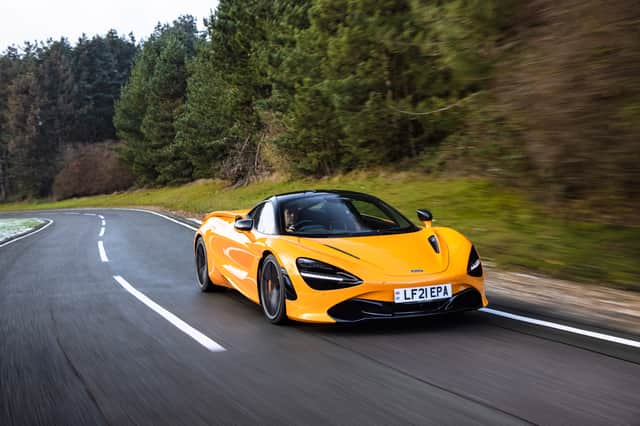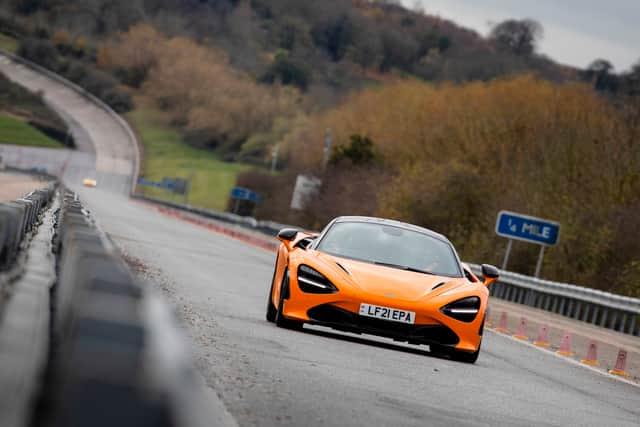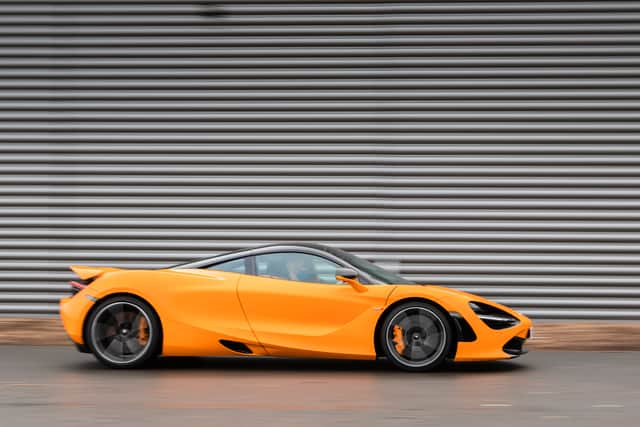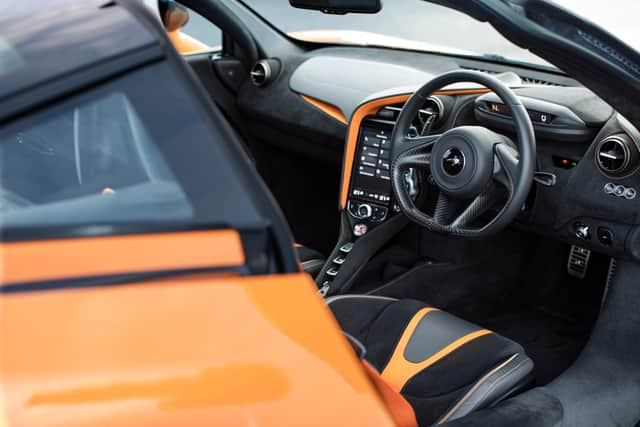McLaren 720S Spider review: Caught in the web of a supercar superstar


There’s nothing quite like spinning the wheels of a £250k sports car at 110mph to properly wake you up in the morning.
I wouldn’t recommend it as an alternative to a strong coffee but it certainly gets the blood pumping.
Advertisement
Hide AdAdvertisement
Hide AdThis, please note, was not some wanton act of stupidity. The brief loss of traction happened under the supervision of a McLaren professional driver and in the relatively safe confines of the Millbrook Proving Ground.
But it was a salutary reminder that the McLaren 720S Spider is not a car to be taken lightly. On a cold, damp winter’s morning a fraction too much throttle was enough for the car’s massive Pirelli P Zero tyres to break traction from the Millbrook mile straight’s Tarmac and send the car’s (and my) back end twitching.


That sort of thing is bound to happen occasionally when you’ve got 710bhp being sent to just the rear two wheels, no matter how good your traction control is. But wasn’t enough to stop me giving it a few more goes to see how close I could get to the lurid Helios Orange car’s official 0-60mph time of 2.8 seconds. The answer was not very but the car’s gut-punching pace was still very much in evidence.
There’s something hugely visceral about the way the 720S performs. The breath-taking surge of acceleration is compounded by the high-pitched mechanical wail that builds from the twin-turbo V8 over your shoulder. The way you sit inches from the road but surrounded by glass gives a good view of the world as it blurs past. It’s not a feeling to be forgotten.
Advertisement
Hide AdAdvertisement
Hide AdThe way the 720S builds pace is simply staggering but what’s perhaps even more impressive is the way it shaves off speed. On the same cold greasy surface near-emergency stop levels of braking from three-figure speeds failed to unsettle the car at all. The massive carbon ceramic brakes do a lot of the stopping but the active rear wing plays a significant role as well. Not only does it fold up to act as an air brake but in doing so it increases downforce on the rear wheels, keeping the car evenly balanced and completely stable.
It’s the sort of smart engineering approach you’d expect from a brand that has its origins in the high-tech world of F1 and which has been at the forefront of supercar technology with its carbon fibre monocoque.


The MonoCage 2 which forms the backbone of the 720S is the latest version of the tub which sits at the heart of all McLarens, from the GT to the Elva, and contributes to the 720S registering the lowest dry weight of any car in its class.
That lightness obviously aids acceleration but the lack of weight and immense rigidity of the carbon fibre is also central to the 720S’s outstanding handling, which saw it make easy work of Millbrook’s infamous Alpine Route, even with this cack-handed amateur at the wheel.
Advertisement
Hide AdAdvertisement
Hide AdThe light, stiff structure along with the three-mode adaptive suspension, electronic chassis control and hydraulic rather than electronic power steering makes for an utterly beguiling driving experience. Direction changes through the perfectly weighted steering are ultra precise and the car feels like it is pivoting around a central point. To call it agile is to underplay the speed and deftness with which the McLaren moves, yet it always feels composed and stable, even over rough surfaces.
Such wizardry is impressive on a challenging technical piece of road but what impresses about the 720S is that it also makes for a supercar that’s relatively easy to drive normally. The steering is responsive but not snatchy, so usable in everyday traffic, and the throttle easy to modulate when you’re not deliberately trying to provoke it. Despite its ferocious potential you never feel that the car is on a hair trigger.


That’s not to say it’s as suited to day-to-day motoring as something like a Porsche 911 or Audi R8. They both impress with logical, comfortable cabins and common sense design while the McLaren with its wild dihedral doors, tight cabin and out-there interior styling is about drama and theatrics as much as it is about usability.
But that’s what makes the 720S such a compelling car. For all it is remarkably biddable at low speeds it really comes to life when you’re making the most of its performance. Find a suitable stretch or road and it’s an unashamed, unapologetic supercar that’s all about noise, spectacle, engineering excellence and breathtaking performance.
McLaren 720S Spider Performance
Advertisement
Hide AdAdvertisement
Hide AdPrice: £245,700 (£281,550 as tested); Engine: 4.0-litre, V8, twin-turbo, petrol; Power: 710bhp; Torque: 568lb ft; Transmission: Seven-speed SSG automatic; Top speed: 212mph; 0-60mph: 2.8 seconds; Economy: 23.2mpg; CO2 emissions: 276g/km
Comment Guidelines
National World encourages reader discussion on our stories. User feedback, insights and back-and-forth exchanges add a rich layer of context to reporting. Please review our Community Guidelines before commenting.
